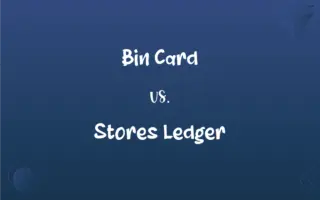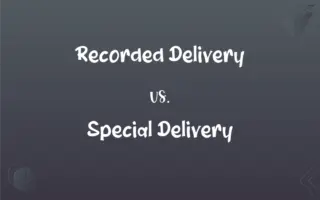Search vs. Seek: What's the Difference?
Edited by Aimie Carlson || By Janet White || Published on February 6, 2024
Search typically refers to a systematic or thorough examination to find something, while seek often implies a quest or endeavor to find something.

Key Differences
Search often connotes a more systematic, thorough examination or exploration, often involving looking through various places or within various possibilities to find something specific. Seek, on the other hand, suggests an attempt or desire to find something, which might be more abstract or less defined.
When using search, it usually involves an active process with a clear methodology, like searching a room or searching for information online. Seek is used in contexts that imply a journey or quest, often for something less tangible, like seeking happiness or seeking the truth.
In terms of usage, search is commonly employed in legal and technical contexts, like a police search or a search algorithm. Seek is more likely used in a philosophical or introspective sense, as well as in more formal or literary contexts.
The grammatical structure around these words can differ. Search is often followed by 'for' when the object is mentioned (search for treasure), whereas seek is used directly with the object (seek wisdom). This reflects the more direct, intentional aspect of seeking as opposed to the procedural aspect of searching.
Search can also be a noun, referring to the act of searching (a search was conducted), whereas seek is solely a verb, emphasizing the action or process of seeking.
ADVERTISEMENT
Comparison Chart
Primary Meaning
Systematic examination to find something
Attempt or desire to find something
Contextual Use
Often used in legal, technical, or practical scenarios
Common in philosophical, introspective, or literary contexts
Grammatical Structure
Typically followed by 'for' when an object is mentioned
Used directly with the object
Formality
Common in everyday usage
Often used in more formal or literary language
Part of Speech
Can be a noun or a verb
Solely a verb
ADVERTISEMENT
Search and Seek Definitions
Search
To look into or over carefully or thoroughly in an effort to find or discover something.
He searched the database for information.
Seek
To try to obtain or achieve.
He seeks to improve his skills.
Search
To look through a place or area to find something.
The detective searched the room for clues.
Seek
To go in search or quest of.
The knight seeks the grail.
Search
To examine or investigate thoroughly.
Scientists are searching for a cure to the disease.
Seek
To explore or examine in order to discover.
They seek the truth about the incident.
Search
To inquire into or discuss in detail.
The book searches the implications of climate change.
Seek
To attempt to find something.
They seek a hidden treasure in the forest.
Search
To explore a database, the internet, or a computer file to locate information.
She searched the internet for recipes.
Seek
To ask for; request.
She seeks advice from her mentor.
Search
To move around in, go through, or look through in an effort to find something
Searched the room for her missing earring.
Searched the desk for a pen.
Seek
To try to locate or discover; search for
Animals seeking prey.
Seek
To endeavor to obtain or reach
Seek a college education.
FAQs
Is 'search' formal or informal?
'Search' is common in both formal and informal contexts.
Do we say 'search for' something?
Yes, 'search' is often followed by 'for' when specifying the object.
Can 'seek' be used as a noun?
No, 'seek' is solely a verb.
Is 'search' used as a noun?
Yes, 'search' can be a noun, referring to the act of searching.
Is 'seek' followed by 'for'?
No, 'seek' is directly used with the object without 'for'.
Can 'search' imply a physical act?
Yes, 'search' often implies a physical act of looking through places.
Can 'search' be used in digital contexts?
Yes, like searching a database or the internet.
Is 'seek' more about method or intention?
'Seek' emphasizes the intention or desire.
What contexts is 'seek' used in?
'Seek' is often used in formal, literary, or introspective contexts.
Is 'seek' always goal-oriented?
Often, as it usually implies a specific aim or desire.
Can 'search' imply a broad examination?
Yes, it can involve a broad or detailed examination.
Does 'seek' imply a physical or abstract process?
'Seek' can imply both, but often leans towards an abstract process.
Is 'search' used in technical contexts?
Yes, it's common in legal, technical, and practical contexts.
Does 'seek' have a philosophical connotation?
Yes, it often implies a deeper, more philosophical quest.
Is 'seek' used in digital contexts?
It's less common, as 'seek' often implies a more personal quest.
Does 'seek' imply a broad or narrow focus?
It can be either, but often is more directed towards a specific goal.
Is 'search' more about method or intention?
'Search' focuses more on the method.
Can 'search' be goal-oriented?
Yes, but it often focuses on the process of searching.
Do both words imply success in finding?
Not necessarily; they describe the process, not the outcome.
Are 'search' and 'seek' interchangeable?
They can be in some contexts, but often have distinct connotations.
About Author
Written by
Janet WhiteJanet White has been an esteemed writer and blogger for Difference Wiki. Holding a Master's degree in Science and Medical Journalism from the prestigious Boston University, she has consistently demonstrated her expertise and passion for her field. When she's not immersed in her work, Janet relishes her time exercising, delving into a good book, and cherishing moments with friends and family.
Edited by
Aimie CarlsonAimie Carlson, holding a master's degree in English literature, is a fervent English language enthusiast. She lends her writing talents to Difference Wiki, a prominent website that specializes in comparisons, offering readers insightful analyses that both captivate and inform.








































































